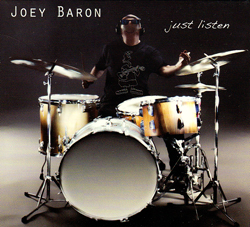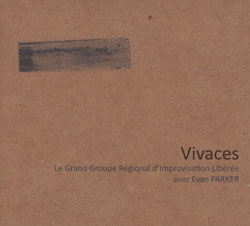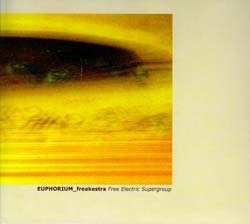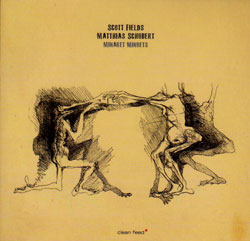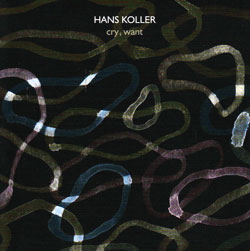
Electric pianist Hans Koller in an 11 piece band with guitarist Bill Frissell, plus Evan Parker on two tracks, playing arrangements of six Koller originals and 2 standards by Charlie Parker and Jimmy Giuffre.
Out of Stock
Quantity in Basket: None
Log In to use our Wish List
Shipping Weight: 3.00 units
Sample The Album:
Percy Pursglove-trumpet
Robbie Bobson-trumpet
Jim Rattigan-french horn
Mark Nightingale-trombone
Sarah Williams-bass trombone
Finn Peters-alto saxophone
Robin Fincker-tenor saxophone, clarinet
Hans Koller-electric piano
Bill Frisell-guitar
Dave Whitford-doublebass
Jeff Williams-drums
Evan Parker-soprano saxophone
Click an artist name above to see in-stock items for that artist.
UPC: 5030243100828
Label: psi
Catalog ID: 10.08
Squidco Product Code: 14086
Format: CD
Condition: New
Released: 2010
Country: Great Britain
Packaging: Digipack
Recorded on November 10th, 2009 at Eastcote Studios, London by Philip Bagenal.
"[...] Like Frisell, Koller is an enigma with jazz roots but displays them more openly, particularly in references to the embracing brass textures of Gil Evans, and to Evans's imaginative, rock-inflected heir Mike Gibbs. Anyone who shivers pleasurably at the sound of an Evans brass section (going all the way back on this set to the Birth of the Cool sound) will be warmed by Cry, Want, and though Frisell fans might find their man's input rather modest, the guitarist's playing alongside Evan Parker's soprano saxophone on the mesmerising title track might well make the CD worth the investment.
Koller is a talented writer with patience foremost among his gifts, as the soft-shuffling "Farewell" shows, with its ringing guitar and beautifully voiced and layered brass, the rhythmic development gently pulling at the melody lines so the piece gradually transforms. The Evans feel is plain on the slow-turning guitar ballad "Estuary", and Parker's soprano and Robin Fincker's clarinet elegantly entwine among the wheeling horns on the anthemic "Hermetique". Frisell's solo playing is mostly a throwback to his early Jim Hall influences, as can be seen when he swings over Jeff Williams's brushwork on "Quasimodo", and when his ensemble playing enhances Fincker's gruff tenor solo on the jubilantly urgent "Reunion". But it's the quietly bluesy, tone-poetic title track and finale - with Frisell's pinging harmonics among muted trumpets and swishing cymbals, and Parker's soprano sounding as Wayne Shorterish as it ever has - that really carries the day."-John Fordham, Guardian UK
Artist Biographies
• Show Bio for Percy Pursglove "After graduating from the Birmingham Conservatoire's BMus(Hons) Jazz course with first class honours, I received a scholarship to study on the Jazz and Contemporary Music Program at the New School University, New York City. During my time living in New York I performed with ensembles including The Duke Ellington Orchestra at Birdland, The Coltrane ensemble and the Rene Marie Big Band at Town Hall, and with Matt Brewer and Tommy Crane at The Knitting Factory. I am now working as a freelance Jazz musician/composer/arranger/recording artist (Trumpet/Double Bass) Since 2005 I have been lecturing in Jazz at the Birmingham Conservatoire senior and junior departments, I also have a roles as director of the National Youth Jazz Wales, tutor for National Youth Jazz Orchestra of Scotland/National Youth Jazz Collective, music for youth mentor and improvisation clinician for Wales Music Teachers Federation. I am also the artistic co-director of Harmonic Festival, producing and promoting two successful and adventurous jazz festivals in Birmingham in recent years. I have featured in a number of performances aired on BBC Radio's Jazz on Three including live concerts with Alex Hawkins, Peter Evans, Paul Dunmall, Elliott Sharpe and a number of radio and televised concerts with the WDR Radio Big Band, Koln. I was a featured in Jazzwise magazine's 'Taking Off' interview. Recent musical highlights include performing Gil Evans Sketches of Spain with the Birmingham Conservatoire Jazz Orchestra and playing Trumpet for Evan Parker's 70th birthday celebration, Kings Place. Some of the most prominent artists I have performed and recorded with include: Claudia Quintet, Food with Thomas Stronen/Iain Ballamy, Bill Frissell, Paul Dunmall, Peter Evans, Jon Irabagon, Hans Koller, Dan Weiss, Matt Brewer, Michael Gibbs, Thomas Morgan, John Hollenbeck, Mark Dresser, Victor Bailey, Drew Gress, Ben Monder, Phil Woods, Claudio Roditi, Jeff Williams, Chris Speed, Matt Mitchell, Evan Parker, Jakob Bro, Elliott Sharpe, Vince Mendoza, Peter Erskine, Django Bates, Steve Swallow, Chris Potter, John O'gallagher, Gerald Clayton, John Clayton, Dave Liebman, Dave Holland and Norma Winstone. For the past twelve months, I have also been a Jazzlines/Jerwood Foundation fellow, hosted at Town Hall-Symphony Hall Birmingham. This has allowed me to compose a new work written for octet and eight-voice choir - 'Far Reaching Dreams of Mortal Souls' - based on speeches and associated works of iconic figures through history. This will premiere in October, where I will perform alongside Julian Arguelles, Paul Clarvis, Hans Koller, Michael Janisch, James Allsop, Jim Rattigan plus choir. I hold honorary membership (Hons BC) to the Birmingham Conservatoire in recognition of services to music." ^ Hide Bio for Percy Pursglove • Show Bio for Bill Frisell "Born in Baltimore, Bill Frisell played clarinet throughout his childhood in Denver, Colorado. His interest in guitar began with his exposure to pop music on the radio. Soon, the Chicago Blues became a passion through the work of Otis Rush, B.B. King, Paul Butterfield and Buddy Guy. In high school, he played in bands covering pop and soul classics, James Brown and other dance material. Later, Bill studied music at the University of Northern Colorado before attending Berklee College of Music in Boston where he studied with John Damian, Herb Pomeroy and Michael Gibbs. In 1978, Frisell moved for a year to Belgium where he concentrated on writing music. In this period, he toured with Michael Gibbs and first recorded with German bassist Eberhard Weber. Bill moved to the New York City area in 1979 and stayed until 1989. He now lives in Seattle. "When I was 16, I was listening to a lot of surfing music, a lot of English rock. Then I saw Wes Montgomery and somehow that kind of turned me around. Later, Jim Hall made a big impression on me and I took some lessons with him. I suppose I play the kind of harmonic things Jim would play but with a sound that comes from Jimi Hendrix", Frisell told Wire. Bill also lists Paul Motian, Thelonious Monk, Aaron Copland, Bob Dylan, Miles Davis and his teacher, Dale Bruning, as musical influences. Bill recorded his first two albums as a leader on ECM, both produced by Manfred Eicher. Subdued and lyrical in nature, In Line, the first of the ECM recordings, employed both electric and acoustic guitars in a series of solos (including some overdubbing) and duets with bassist Arild Andersen. Second was Rambler, featuring Kenny Wheeler, Bob Stewart, Jerome Harris and Paul Motian. About Rambler, Fanfare said: "Bill Frisell has built a little masterpiece here - not just a showcase for his own instrumental creativity (of which there is much in evidence), but a clever and poetic whole." Frisell's third album and last for ECM, Lookout For Hope, marked the recording debut of The Bill Frisell Band featuring Hank Roberts, Kermit Driscoll and Joey Baron. Produced by Lee Townsend, the album's diverse material - ranging from country swing to reggae, quasi-heavy metal and backbeat rock with a twist to Monk's "Hackensack" - nevertheless possessed the cohesive and unmistakable personality of a working band on to a sound of its own. High Fidelity called it "the fullest showing of Frisell's ability to date, especially his compositional range." The Chicago Tribune said, "Lookout For Hope offers one of the most hopeful signs that contemporary jazz can evolve with dignity, wit and charm." Before We Were Born, Frisell's debut recording for Nonesuch, featured three musical settings: Peter Scherer and Arto Lindsay produced, co-arranged and performed on three Frisell compositions. "Some Song and Dance", produced by Lee Townsend, is a suite of four pieces performed by Frisell's Band with a saxophone section featuring Julius Hemphill, Billy Drewes and Doug Wieselman. Frisell's "Hard Plains Drifter" is an extended work shaped, produced and arranged by John Zorn and played by the Frisell Band. The New York Times observed: "By following through on the implications of his unfettered sounds, Mr. Frisell has made his best album." Frisell's second Nonesuch album, Is That You?, features nine original Frisell compositions, one by producer Wayne Horvitz and two cover tunes - "Chain of Fools" and "Days of Wine and Roses". With Frisell playing guitars, bass, banjo, ukulele and even clarinet, Is That You? demonstrated with great clarity his pan-stylistic, yet strangely unified musical world. Musician called the album "a very personal vision, tearing down stylistic barriers with delicacy and sudden bursts of emotion." Frisell's third album for Nonesuch, Where in the World?, also produced by Wayne Horvitz, was the band's final recording with cellist Hank Roberts. The Philadelphia Inquirer said: "There is nothing standard about Where in the World?...Frisell is not only a master of an unusual guitar-based sonic tapestry, he's one of the few composers capable of writing for an interactive ensemble." Have a Little Faith, Frisell's 1992 Nonesuch recording, was something of a tribute album. Here, he interpreted the music of a number of American composers whose music had inspired him - Aaron Copland, Muddy Waters, Bob Dylan, John Hiatt, Sonny Rollins, Stephen Foster, Charles Ives, Victor Young, Madonna and John Philip Sousa. The extent to which Bill has made this music his own demonstrates the completeness of its link to his own compositional approach. For this recording Frisell's Band was augmented by Don Byron (clarinet, bass clarinet) and Guy Klucevsek (accordion) and produced by Wayne Horvitz. The San Francisco Bay Guardian said, "Frisell treats each piece with typical earnestness and lyricism, breaking into wrenching distortion and stormy group improv only after breathing the original full of a softly glowing life." This Land, Frisell's fifth Nonesuch recording, consists of all original material with the band and a horn section of Don Byron (clarinets), Billy Drewes (alto saxophone) and Curtis Fowlkes (trombone). Produced by Lee Townsend, the album readily displays the connection between Frisell's own writing and the composers' work to whom he pays tribute on his previous Have a Little Faith. From the standpoint of synthesizing his celebrated composing and arranging talents with exuberant improvising and spirited band interaction, it is a landmark recording, which prompted this description in Rolling Stone: "Strange meetings of the mysterious and the earthy, the melancholy and the giddy, make perfect sense by Frisell's deliciously warped way of thinking. The warpage is catching on and not a moment too soon." In 1994, Frisell recorded a pair of recordings of music that he composed for three silent Buster Keaton films - The High Sign, One Week and Go West. The band premiered this music along with the films to a spirited and sold-out audience at St. Ann's in Brooklyn in May '93. The pairing displayed a natural affinity between work of both artists. Their works together possess an undeniable sense of adventure and penchant for the unexpected that only enhances the warmth and humanity of both the musical elements and the films themselves. It has proven to be the rare case where the whole truly transcends the sum of its parts. Of the "Go West" recording , Billboard noted: "With this set of music for the classic Buster Keaton film, "Go West," Bill Frisell has crafted one of his finest, most evocative albums. Evincing his best qualities as both guitarist and composer, he harvests melancholy Americana from deceptively modest, episodic themes. Coloring the scenes with acoustic as well as his trademark electric, Frisell produces strangely cinematic motifs on guitar, and his rhythm cohorts - longtime bassist Kermit Driscoll and drummer Joey Baron - provide abundant narrative drive." Both albums were produced by Lee Townsend. Frisell's success with the Keaton films has led him to other film-related projects. He scored the music for Gary Larson's "Tales From the Far Side" animated television special and Daniele Luchetti's Italian feature film, "La Scuola." Some of the music from these projects has been adapted and recorded by Frisell on Quartet, Frisell's Nonesuch recording released in April '96. The formation of the Quartet, with Ron Miles (trumpet), Eyvind Kang (violin) and Curtis Fowlkes (trombone), was a new working band for Frisell, who had worked with the telepathic rhythm combination of Kermit Driscoll and Joey Baron for nearly ten years. Frisell told Down Beat: "It's so different from the traditional guitar-bass-drum thing, even though Joey Baron, Kermit Driscoll and I never played like a typical jazz trio. This group, with violin and brass, can play an orchestral range of sounds. It's gigantic. It's given me a chance to write and arrange in an even bigger way." Quartet, was quickly hailed by critics. The New York Times declared: "Quartet may be his masterpiece." Nonesuch released Nashville in April of 1997. Recorded in Nashville and produced by Wayne Horvitz with members of Allison Krauss' Union Station band - mandolin player Adam Steffey and banjo player Ron Block - the project also features her brother and Lyle Lovett's bass player Viktor Krauss, dobro great Jerry Douglas, vocalist Robin Holcomb and Pat Bergeson on harmonica. "Comprising acoustic instrumental folk tunes with unpredictable stylistic accents, Nashville boasts a dreamy, seductive grandeur. The backing mandolin/dobro/bass interplay simmers - Frisell himself picks and strings and most of all floats, laying out liquid tones that settle over the melodies like heat haze on a swampy, swimmerless lake." wrote the LA Weekly. The Atlanta Journal-Constitution summed it up simply as, "Frisell's nod to Nashville is Americana at its best." In January of 1998 Frisell's next project Gone, Just Like A Train came out. On this exceptionally melodic and rhythmically vital instrumental collection of original compositions, Frisell is joined by Viktor Krauss and by Jim Keltner, all star drummer of choice for Bob Dylan, Ry Cooder, T-Bone Burnett, George Harrison, John Lennon and The Traveling Wilburys. The Rocket in Seattle wrote that "Frisell has managed to pull together an ad hoc super trio of musicians from drastically different pasts, and they manage to assemble a machine of colossal proportions: part skewered jazz, part roadside folk blues, part gritty rock..Gone presents Frisell at a creative apex. He's integrated a thoroughly unique understanding of so much American Music. And it's all gift-wrapped in a lean, unimposing trio framework that conveys sheer genius in a million directions. It flies with shining power." Produced by Lee Townsend, the album proved to be one of Frisell's most celebrated and popular to date. Good Dog, Happy Man, brims full of Frisell's shimmering original compositions. Here he is reunited with the Gone Just Like a Train rhythm section of Viktor Krauss on bass and Jim Keltner on drums and joined by Wayne Horvitz on Hammond B3 organ, multi-instrumentalist/slide guitarist Greg Leisz (known for his work with Joni Mitchell, K.D. Lang, Emmy Lou Harris, Beck and Jimmie Dale Gilmore, among others) plus special guest Ry Cooder on the traditional folk song "Shenendoah". Produced by Lee Townsend, Good Dog, Happy Man celebrates Frisell's emergence as a composer who has created a genre unto himself. The Philadelphia Inquirer wrote: "The 12 breathtakingly beautiful originals on Good Dog, Happy Man resist every obvious classification. Frisell's been doing the undefinable for years - creating revelatory music from threadbare accompaniment; finding vital contexts for jazz improvisation that are worlds away from bebop; burying shiny nuggets of melody beneath a gauzy lace-like surface. Frisell manages to evoke big worlds with stark single notes and foreboding sustained tones, conjuring a richly textured atmosphere that is both understated and undeniable. No matter what you call it." " ^ Hide Bio for Bill Frisell • Show Bio for Jeff Williams "Jeff Williams drums. Born July 6, 1950 in Mount Vernon, Ohio, Jeff Williams grew up in the small college town of Oberlin and began playing in area jazz clubs at age 14. Moving to Boston in 1968, Jeff attended the Berklee College of Music where he studied with Alan Dawson. In 1971 Jeff began his professional career in New York, a year later joining the Stan Getz Quartet ('72 -'74) in an edition that included Dave Holland and Richie Beirach or Albert Daily. (Jeff toured again with Getz for much of 1988, with Kenny Barron and Anthony Cox). Along with Beirach, Dave Liebman, and Frank Tusa, Jeff formed the group Lookout Farm, touring internationally from 1973-76. The band's recordings include Lookout Farm and Drum Ode (ECM) and Sweet Hands (A&M/Horizon). In succeeding years Jeff has accompanied a wide variety of musicians. A partial list includes: John Abercrombie, Paul Bley, Randy Brecker, George Coleman, Marc Copland, Art Farmer, Joe Farrell, Dizzy Gillespie, Clifford Jordan, Cecil McBee, George Mraz, Gary Peacock, Michel Petrucciani, John Scofield, Miroslav Vitous, and Cedar Walton." ^ Hide Bio for Jeff Williams • Show Bio for Evan Parker "Evan Parker was born in Bristol in 1944 and began to play the saxophone at the age of 14. Initially he played alto and was an admirer of Paul Desmond; by 1960 he had switched to tenor and soprano, following the example of John Coltrane, a major influence who, he would later say, determined "my choice of everything". In 1962 he went to Birmingham University to study botany but a trip to New York, where he heard the Cecil Taylor trio (with Jimmy Lyons and Sunny Murray), prompted a change of mind. What he heard was "music of a strength and intensity to mark me for life ... l came back with my academic ambitions in tatters and a desperate dream of a life playing that kind of music - 'free jazz' they called it then." Parker stayed in Birmingham for a time, often playing with pianist Howard Riley. In 1966 he moved to London, became a frequent visitor to the Little Theatre Club, centre of the city's emerging free jazz scene, and was soon invited by drummer John Stevens to join the innovative Spontaneous Music Ensemble which was experimenting with new kinds of group improvisation. Parker's first issued recording was SME's 1968 Karyobin, with a line-up of Parker, Stevens, Derek Bailey, Dave Holland and Kenny Wheeler. Parker remained in SME through various fluctuating line-ups - at one point it comprised a duo of Stevens and himself - but the late 1960s also saw him involved in a number of other fruitful associations. He began a long-standing partnership with guitarist Bailey, with whom he formed the Music Improvisation Company and, in 1970, co-founded Incus Records. (Tony Oxley, in whose sextet Parker was then playing, was a third co-founder; Parker left Incus in the mid-1980s.) Another important connection was with the bassist Peter Kowald who introduced Parker to the German free jazz scene. This led to him playing on Peter Brötzmann's 1968 Machine Gun, Manfred Schoof's 1969 European Echoes and, in 1970, joining pianist Alex von Schlippenbach and percussionist Paul Lovens in the former's trio, of which he is still a member: their recordings include Pakistani Pomade, Three Nails Left, Detto Fra Di Noi, Elf Bagatellen and Physics. Parker pursued other European links, too, playing in the Pierre Favre Quartet (with Kowald and Swiss pianist Irene Schweizer) and in the Dutch Instant Composers Pool of Misha Mengelberg and Han Bennink. The different approaches to free jazz he encountered proved both a challenging and a rewarding experience. He later recalled that the German musicians favoured a "robust, energy-based thing, not to do with delicacy or detailed listening but to do with a kind of spirit-raising, a shamanistic intensity. And l had to find a way of surviving in the heat of that atmosphere ... But after a while those contexts became more interchangeable and more people were involved in the interactions, so all kinds of hybrid musics came out, all kinds of combinations of styles." A vital catalyst for these interactions were the large ensembles in which Parker participated in the 1970s: Schlippenbach's Globe Unity Orchestra, Chris McGregor's Brotherhood of Breath, Barry Guy's London Jazz Composers Orchestra (LJCO) and occasional big bands led by Kenny Wheeler. In the late 70s Parker also worked for a time in Wheeler's small group, recording Around Six and, in 1980, he formed his own trio with Guy and LJCO percussionist Paul Lytton (with whom he had already been working in a duo for nearly a decade). This group, together with the Schlippenbach trio, remains one of Parker's top musical priorities: their recordings include Tracks, Atlanta, Imaginary Values, Breaths and Heartbeats, The Redwood Sessions and At the Vortex. In 1980, Parker directed an Improvisers Symposium in Pisa and, in 1981, he organised a special project at London's Actual Festival. By the end of the 1980s he had played in most European countries and had made various tours to the USA, Canada, Australia, New Zealand and Japan. ln 1990, following the death of Chris McGregor, he was instrumental in organising various tributes to the pianist and his fellow Blue Notes; these included two discs by the Dedication Orchestra, Spirits Rejoice and lxesa. Though he has worked extensively in both large and small ensembles, Parker is perhaps best known for his solo soprano saxophone music, a singular body of work that in recent years has centred around his continuing exploration of techniques such as circular breathing, split tonguing, overblowing, multiphonics and cross-pattern fingering. These are technical devices, yet Parker's use of them is, he says, less analytical than intuitive; he has likened performing his solo work to entering a kind of trance-state. The resulting music is certainly hypnotic, an uninterrupted flow of snaky, densely-textured sound that Parker has described as "the illusion of polyphony". Many listeners have indeed found it hard to credit that one man can create such intricate, complex music in real time. Parker's first solo recordings, made in 1974, were reissued on the Saxophone Solos CD in 1995; more recent examples are Conic Sections and Process and Reality, on the latter of which he does, for the first time, experiment with multi-tracking. Heard alone on stage, few would disagree with writer Steve Lake that "There is, still, nothing else in music - jazz or otherwise - that remotely resembles an Evan Parker solo concert." While free improvisation has been Parker's main area of activity over the last three decades, he has also found time for other musical pursuits: he has played in 'popular' contexts with Annette Peacock, Scott Walker and the Charlie Watts big band; he has performed notated pieces by Gavin Bryars, Michael Nyman and Frederic Rzewski; he has written knowledgeably about various ethnic musics in Resonance magazine. A relatively new field of interest for Parker is improvising with live electronics, a dialogue he first documented on the 1990 Hall of Mirrors CD with Walter Prati. Later experiments with electronics in the context of larger ensembles have included the Synergetics - Phonomanie III project at Ullrichsberg in 1993 and concerts by the new EP2 (Evan Parker Electronic Project) in Berlin, Nancy and at the 1995 Stockholm Electronic Music Festival where Parker's regular trio improvised with real-time electronics processed by Prati, Marco Vecchi and Phillip Wachsmann. "Each of the acoustic instrumentalists has an electronic 'shadow' who tracks him and feeds a modified version of his output back to the real-time flow of the music." The late 80s and 90s brought Parker the chance to play with some of his early heroes. He worked with Cecil Taylor in small and large groups, played with Coltrane percussionist Rashied Ali, recorded with Paul Bley: he also played a solo set as support to Ornette Coleman when Skies of America received its UK premiere in 1988. The same period found Parker renewing his acquaintance with American colleagues such as Anthony Braxton, Steve Lacy and George Lewis, with all of whom he had played in the 1970s (often in the context of London's Company festivals). His 1993 duo concert with Braxton moved John Fordham in The Guardian to raptures over "saxophone improvisation of an intensity, virtuosity, drama and balance to tax the memory for comparison". Parker's 50th birthday in 1994 brought celebratory concerts in several cities, including London, New York and Chicago. The London performance, featuring the Parker and Schlippenbach trios, was issued on a highly-acclaimed two-CD set, while participants at the American concerts included various old friends as well as more recent collaborators in Borah Bergman and Joe Lovano. The NYC radio station WKCR marked the occasion by playing five days of Parker recordings. 1994 also saw the publication of the Evan Parker Discography, compiled by ltalian writer Francesco Martinelli, plus chapters on Parker in books on contemporary musics by John Corbett and Graham Lock. Parker's future plans involve exploring further possibilities in electronics and the development of his solo music. They also depend to a large degree on continuity of the trios, of the large ensembles, of his more occasional yet still long-standing associations with that pool of musicians to whose work he remains attracted. This attraction, he explained to Coda's Laurence Svirchev, is attributable to "the personal quality of an individual voice". The players to whom he is drawn "have a language which is coherent, that is, you know who the participants are. At the same time, their language is flexible enough that they can make sense of playing with each other ... l like people who can do that, who have an intensity of purpose." " ^ Hide Bio for Evan Parker
4/10/2024
Have a better biography or biography source? Please Contact Us so that we can update this biography.
4/10/2024
Have a better biography or biography source? Please Contact Us so that we can update this biography.
4/10/2024
Have a better biography or biography source? Please Contact Us so that we can update this biography.
4/10/2024
Have a better biography or biography source? Please Contact Us so that we can update this biography.
Track Listing:
1. Nocturne 6:23
2. Farewell 5:07
3. Riff Raff 6:26
4. Estuary 4:09
5. Hermetique 2:36
6. Quasimodo 3:17
7. Reunion 9:44
8. Cry, Want 13:00
EMANEM & psi
Improvised Music
Jazz
European Improv, Free Jazz & Related
Staff Picks & Recommended Items
London & UK Improv & Related Scenes
Parker, Evan
Instant Rewards
Search for other titles on the label:
psi.





